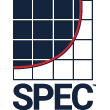SPEC CPU95 Press Release
SPEC Announces SPEC95 Benchmark Suites As New Standard for Measuring
Performance
Need to accommodate new technology forces retirement of SPEC92
FAIRFAX, VA, August 21, 1995 -- The Standard Performance Evaluation Corp.
(SPEC) announces the release of the SPEC95 benchmark suites, the latest
version of the worldwide standard for measuring and comparing computer
performance across different hardware platforms. SPEC95 was developed by
SPEC's Open Systems Group (OSG), which includes more than 30 leading
computer vendors, systems integrators, publishers and consultants
throughout the world.
"Computer systems technology evolves so rapidly that we must provide
new benchmark suites every two to three years to ensure a level playing
field," says Kaivalya M. Dixit, SPEC president. "SPEC92 was a
great success, but it is time to make the transition to standardized
benchmarks that reflect the advances in chip technologies, compilers and
applications that have taken place over the last three years; those
benchmarks constitute SPEC95."
SPEC95 comprises two sets (or suites) of benchmarks: CINT95 for
compute-intensive integer performance and CFP95 for compute-intensive
floating point performance. The two suites provide component-level
benchmarks that measure the performance of the computer's processor,
memory architecture and compiler. SPEC benchmarks are selected from
existing application and benchmark source code running across multiple
platforms. Each benchmark is tested on different platforms to obtain fair
performance results across competing hardware and software systems.
SPEC95 is the third major version of the SPEC benchmark suites, which in
1989 became the first widely accepted standard for comparing
computeintensive performance across various architectures. The new release
replaces SPEC92, which will be gradually phased out between now and June
1996, when SPEC will stop publishing SPEC92 results and stop selling the
benchmark suite. Performance results from SPEC95 cannot be compared to
those from SPEC92, since new benchmarks have been added and existing ones
changed.
"Compiler writers have learned to optimize performance for individual
SPEC92 benchmarks," says Jeff Reilly, SPEC95 release manager.
"The best way to avoid these benchmark specific optimizations is to
develop new benchmark suites." SPEC95 builds on the lessons learned
from the SPEC89 and SPEC92 suites, according to Reilly. The new benchmarks
were analyzed to ensure that they are as resistant as possible to compiler
optimizations that might not translate into realworld performance gains.
Improvements to the suites include longer run times and larger problems for
benchmarks, more application diversity, greater ease of use, and standard
development platforms that will allow SPEC to produce additional releases
for other operating systems.
A Sun SPARCstation 10/40 with 128 MB of memory was selected as the SPEC95
reference machine and Sun SC3.0.1 compilers were used to obtain reference
timings on the new benchmarks. By definition, the SPECint95 and SPECfp95
numbers for the Sun SPARCstation 10/40 are both "1."
The Metrics for Measurement
SPEC95 rules permit both baseline and optimized results for CINT95 and
CFP95 suites. The baseline rules restrict the number of optimizations that
can be used for performance testing. In general, SPEC95 rules are more
restrictive in regard to optimizations than the SPEC92 rules. Baseline
metrics are mandatory for all reported results; reporting of optimized
results is optional.
SPEC95 also allows performance to be measured for both speed and throughput
(rate). Speed metrics such as SPECint95 measure how fast a computer
completes a single task. Rate metrics such as SPECint_rate95 measure how
many tasks a computer can accomplish in a certain amount of time. SPEC95
measures rate performance for single processors, symmetric multi processor
systems and cluster systems.
The CINT95 suite, written in C language, contains eight CPUintensive
integer benchmarks. It is used to measure and calculate the following
metrics:
-
SPECint95
-
The geometric mean of eight normalized ratios (one for each integer
benchmark) when compiled with aggressive optimization for each benchmark.
-
SPECint_base95
-
The geometric mean of eight normalized ratios when compiled with
conservative optimization for each benchmark.
-
SPECint_rate95
-
The geometric mean of eight normalized throughput ratios when compiled
with aggressive optimization for each benchmark.
-
SPECint_rate_base95
-
The geometric mean of eight normalized throughput ratios when compiled
with conservative optimization for each benchmark.
The CFP95 suite, written in FORTRAN language, contains 10 CPU-intensive
floating point benchmarks. It is used to measure and calculate the
following metrics:
-
SPECfp95
-
The geometric mean of 10 normalized ratios (one for each floating point
benchmark) when compiled with aggressive optimization for each benchmark.
-
SPECfp_base95
-
The geometric mean of 10 normalized ratios when compiled with
conservative optimization for each benchmark.
-
SPECfp_rate95
-
The geometric mean of 10 normalized throughput ratios when compiled with
aggressive optimization for each benchmark.
-
SPECfp_rate_base95
-
The geometric mean of 10 normalized throughput ratios when compiled with
conservative optimization for each benchmark.
Vendor Reporting
Initial results for systems from six vendor companies are included with
this release. Additional results will be reported in the next issue of the
SPEC Newsletter, scheduled for publication at the end of September. SPEC
members are being encouraged to report SPEC95 results on older platforms to
provide an historical perspective for the new results.
Availability
SPEC95 (CINT95 and CFP95) is available on CD-ROM from SPEC's
administrator, the National Computer Graphics Association (NCGA). The cost
is $600 for new customers, $300 for new university customers, $300 for
current SPEC92 licensees and $150 for current university licensees.
SPEC is a non-profit corporation formed to establish, maintain and endorse
a standardized set of relevant benchmarks that can be applied to the newest
generation of high-performance computers. Included in its membership are
the Open Systems Group (OSG); OSG Associates, consisting of leading
universities and research facilities; the HighPerformance Group (HPG); and
HPG Associates.
For more information, contact Dianne Rice, SPEC, 10754 Ambassador Avenue,
Manassas, VA 22011; tel: 703.331-0180; fax: 703/331-0181; e-mail:
info@spec.org Press contact: Bob Cramblitt Cramblitt & Company; tel:
919-481-4599; e-mail: Cramblitt@cup.portal.com




